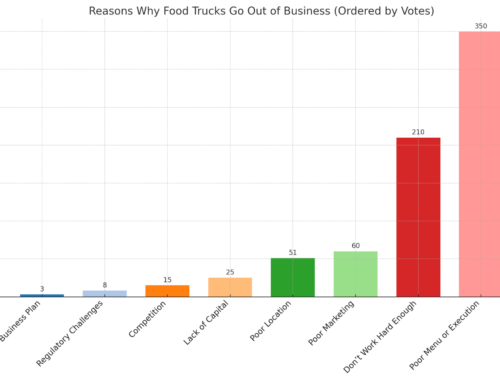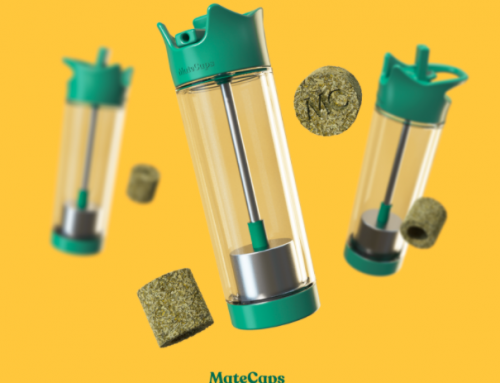Alain Bergery, manager of Prestige Food Trucks based out of Winter Park, FL, was kind enough to respond thoughtfully to numerous email questions, share what it takes to take a food truck from concept to reality, and talk candidly about how to grow a profitable business after the vehicle rolls off of the manufacturer’s lot.
Best of all, Bergery’s got a track record to back-up her advice including first-hand experience working in his father’s concession truck during the early stage of their own business. It was here that Bergery learned about the dedication and commitment required to operate a successful truck longterm, going from business uncertainty in month one of the business to profitability by month three.
In this Food Truck Empire (FTE) exclusive, Bergery shares his unique perspective working on the ground floor of his father’s business and making the transition to helping other business owners realize their goals. This Q/A a must read for anyone considering the mobile restaurant business.
FTE: Tell us a little about your role at Prestige Food Trucks, your title, and a little bit about the business?
Alain Bergery: I am currently a manager at Prestige Food Trucks. I handle new business and assist in the coordination of the building of our amazing food trucks. Once we can figure out a client’s needs, I try and see if they are financially fit to purchase one of our custom built food trucks. After, I make them a custom quote and guide them in the direction that they are trying to go. I send that information over to our design specialist and he builds them the blueprint. If they approve of the quote/blueprint and then want to move forward, I have them sign a contract.
We are a little under a year old, but we are currently on pace to sell around 25 trucks in 2013.
FTE: What’s the most unique food truck Prestige Food Trucks has ever produced for a client?
Alain Bergery: Love You Long Time was the most unique truck that we’ve built (image shown at the top of this post). There are several reasons that made this truck unique. First, it was truly built exactly as the customer envisioned it. Secondly, it has one of the most unique names and concepts in the market today. Asian dishes that you know in love, with hints of trained culinary expertise.
FTE: In your opinion, what are the key characteristics between a food trucks that become successful and those that fail?
Alain Bergery: As a manufacturer I know clients talk to me about some of the things that make them successful. I myself have worked a food truck and I can tell you it is far from easy. People need to treat a food truck like any other up and coming business. Those that have been successful have found a great location that can constantly give them revenue. If, for whatever reason they are not making money on that location, they pick up and find a new one. They don’t get stuck waiting for clients to come to them. They are proactive about their business and always look for new locations that can make them more central.
Also, I have found that the owners that have a good system for their customers to follow their food trucks are very successful as well. One of the methods I’ve seen is through the use of Facebook & Twitter followers that can easily allow customers to see where your truck is going to be located and when.
Next, they need to be able to travel to food truck events. This is how your truck gets known and your food gets tried. These events like Food Truck Wars can make you or break you as a food truck owner because it really puts you in the center of all the competition. Not just in your area, but possibly across the state. It gives you a tool to compare yourself against the industry and allows you to make important changes that can make you profitable.
Consistency is another important one. If you are not consistent with your location once you have found a good one. Then, how is the customer going to feel when he shows up to eat and you’re not there? The term consistency also falls under the food you make. If your food is not fresh and consistent with every order then customers will be able to tell the difference. They want to come to your food truck and taste something fresh and unique that no restaurant can match. Low overhead cost allows you to prepare you meals with higher quality food.
The best characteristic I think an owner needs is dedication. When I first started working a food truck with my father, we made minimal sales a day for the first month. But, after word got around that we were the best lunch truck around the area our sales slowly started increasing. By the 3rd month we were making an easy $500 – $1000 a day just working 10AM to 3PM.
Additionally, food Trucks are constrained in space and get very hot. After, a day’s work you’re going to feel tired and might just want a cold beer. But, you have to always clean as soon as you’re done and prepare for the next day. Once you stop cleaning and preparing for the next day that’s when residue starts to build up and your kitchen begins to look unappealing.
FTE: What’s the most popular size / layout of food truck you’re producing right now? Why do you feel think these are so popular?
Alain Bergery: The most popular size we sell is the 16 FT trucks. It is the most convenient and it’s a great size to fit most of the equipment our clients look for. This usually includes: American Range 4 Burner w/ Oven, 2 Fryers, 36’’ Griddle, Freezer, Refrigerator, Hot Plates, Sandwich Prep Cooler, and plenty of Counter Space.
Once you go below 16 FT we have to cut back on some of equipment we can fit into the truck. Ultimately, the smaller truck you can get away with, the better. Since most food truck owners are not used to driving large trucks, this helps tremendously getting from point A to B.
FTE: What’s one of the most important aspects of a food truck should you be sure to invest in as an owner? On the flip side, what elements of a food truck can you save money on as an owner without sacrificing overall quality?
Alain Bergery: The most important aspects of a food truck are going to the quality of the plumbing, electrical, commercial equipment and the mechanical condition of the truck itself. The truck is the basis of your business and it needs to be of high quality to maintain efficiency. Prestige Food trucks prides itself at obtaining the upmost quality in each of these departments.
A way to save money is to have a good idea of the types of foods that you’re selling. If your menu doesn’t have fried food then don’t get a fryer. A lot of our clients want equipment in the trucks that they end up not using but want it as a safe guard. I believe that most of them till this day still don’t use the equipment that they wanted in their truck as a safety net, just in case they start using it one day. This drives up startup cost and it can always be added on later.
Another way is to make sure you have people with good driving records listed on the commercial insurance. This alone could save you upwards of a $1,000 per year.
Finally, just treat your business, like a business. Always try to cut food & material costs if possible. Basically, be as efficient as you can without sacrificing the quality of your overall product.
FTE: Before investing in a food truck, what are the most important aspects an entrepreneur should consider that is often overlooked by first time food truck owners?
Alain Bergery: Working times are very extensive even more so than a restaurant. You have to spend a lot of time prepping the food and getting it ready for next day’s work. This can easily add an hour or two of just prepping. Then food truck owners will be working however many hours they decide to sell their meals. Finally, they have to spend another 1-2 hours at the end of the day cleaning and preparing for the next day.
Getting new equipment as opposed to used equipment. Used equipment doesn’t have warrant and commercial equipment is not made to be mobile so you want warranty on expensive cooking equipment.
Finally, I think that customer feedback is one of the most important aspects and usually the one most over looked. The best part about this is the customer is usually right in front of you looking at your truck tasting your food. So, you can easily ask them their opinion on what they think you should do differently. This will allow you to grow as a business and make your truck more efficient.
FTE: Any closing thoughts you would like to share?
Alain Bergery: Entrepreneurs need to be prepared for hard work and long hours. This business takes constant dedication, preparedness, and a bit of luck to be successful. The luck comes in when it’s time to find the location. In the beginning location is going to be the biggest factor. If you don’t have a good location your food truck will never get off the ground.
Food truck entrepreneurs need to have a good concept ready when they buy their food truck. Ask friends, family members, and even random strangers if they would eat your desired cuisine. I recommend having as many people try your food as possible!
Finally, start-ups need to make sure that they have numerous locations where they can start working and analyzing on whether it is a good location or not. “Location, Location, Location” is one of the most important aspects in being successful in this newly competitive industry. Look into what are the best hours that a certain location has the most foot traffic and/or hits your targeted demographic.
Remember, success never comes easy!




